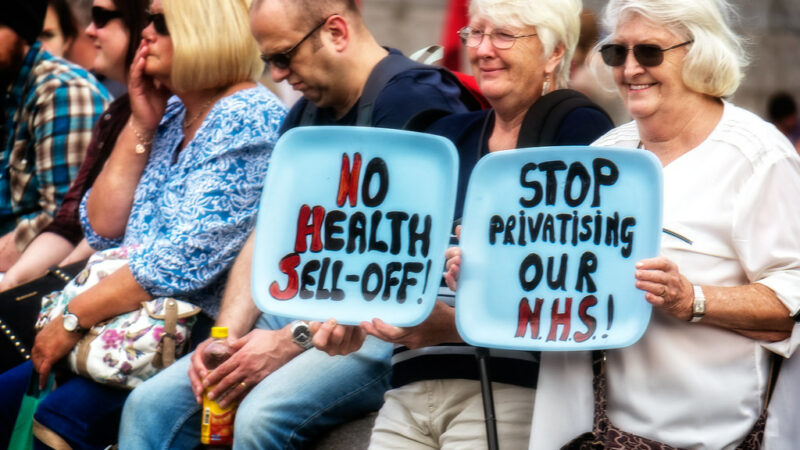'This new Bill that will be voted on in parliament this week should really be called the NHS Corporate Takeover Bill.'

Richard Burgon MP is the Member of Parliament for East Leeds
Cat Hobbs is the Director of public ownership campaigning organisation, We Own It
The fallout of the Owen Patterson case has shaken our politics to the core. It has become a lightning rod for the deep public outrage at the dodgy contracts and wider corruption repeatedly exposed throughout the Covid crisis.
It’s no wonder the public is angry. The deepest public health scandal in a generation, and the unnecessary deaths of tens of thousands of people, has been used as a money-making scheme for those with friends in high places in the Government. The sums are eye-watering. Nearly £5bn in contracts has been awarded to companies with political connections through a “VIP fast lane” alone.
But even as this cronyism is finally getting the public exposure it so merits, the government is pushing through a new Health and Care Bill that could make the dodgy contracts we have seen so far in the pandemic look like a drop in the ocean.
This new Bill that will be voted on in parliament this week should really be called the NHS Corporate Takeover Bill. It purports to be an attempt to address the deep failings of the past decade that have brought our NHS to the point of collapse. That’s simply not the case.
The current crisis was driven by austerity, cuts, privatisation and the disastrous 2012 marketisation of our NHS. Yet this Bill entrenches an even greater role for private companies in our NHS, one where private companies not only profit from people’s ill health but increasingly get to decide who gets what treatments and when.
One deep concern is that the Bill opens the door for private corporations to sit on the 42 local health boards—the so-called integrated care boards—which make critical decisions about NHS budgets and services.
It does this while also allowing contracts to be awarded to private healthcare providers with even less transparency than they are now.
So this push for greater privatisation shouldn’t be seen as separate from the debate on corruption – it’s part of it. Private healthcare providers will have a bigger say and with less scrutiny – and so dodgy contracts are even more likely.
NHS bodies will no longer have to put bids out to competitive tender – a move that was long demanded by those opposed to the privatisation of our NHS. But instead of the NHS becoming the default provider, the Bill leaves it wide open that contracts can be awarded to private healthcare providers without considering any other bids.
This makes this Bill a charter for corruption. The dodgy allocation of contracts we have seen throughout Covid risks becoming the norm.
The Bill will also exclude clinical services from the Public Contract Regulations which means that issues like past performance and compliance with some employment and environmental rules will no longer be a consideration in awarding contracts.
What we have seen with the £37bn squandered on Test and Trace should serve as a warning to what the government could do with the whole of our NHS. But the stealth privatisation of healthcare does not end there.
An unbelievable £100 billion has gone to non-NHS providers of healthcare over the last decade alone.
Separately 500,000 patients have had their GP services quietly passed into the hands of a US health insurance giant. Its UK subsidiary, Operose Health, is the largest private supplier of GP services in the UK. Are we really meant to believe it is a coincidence that Operose Health’s former chief executive officer, Samantha Jones, was appointed as an adviser to the Prime Minister on NHS transformation?
So far, the government has shrugged off all the concerns raised about this bill from the opposition benches or from outside parliament. But they know that now more than ever, they will need to shore up public trust in politicians
If the government wants to dispel the fears that this new Health and Care Bill is really about an even bigger corporate handout then there is a simple amendment it could back. We are calling for MPs to support changes to the Bill that establishes the NHS as the default option for all NHS contracts and to only tender competitively where this is not possible.
At a stroke, this would cut out the opportunity for the kind of dodgy contracts that are now causing such a public backlash. But if the government refuses to back this amendment, then the public should be on high alert.
To reach hundreds of thousands of new readers we need to grow our donor base substantially.
That's why in 2024, we are seeking to generate 150 additional regular donors to support Left Foot Forward's work.
We still need another 117 people to donate to hit the target. You can help. Donate today.



